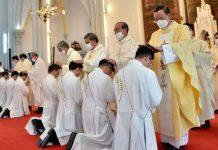In a complaint to the Vatican, the women, who say they were recruited into Opus Dei under false promises of higher education, now claim they were forced to labour under “manifestly illegal conditions.”
Newsroom (10/07/2022 5:00 PM Gaudium Press) Saint Josemaria Escriva, the founder of the Catholic organization Opus Dei, which emphasizes the dignity of everyday Work, once famously told the employees of a Spanish university he founded that the dean was no more important than the people who cleaned the classrooms.
However noble-sounding that rhetoric may be, according to 43 women in Argentina, it didn’t ring true when it came to them.
In a complaint to the Vatican, the women, allegedly recruited into Opus Dei under false promises of higher education, now claim they were instead forced to labour under “manifestly illegal conditions.” These include working without pay for more than 12 hours a day, without breaks except for food or prayer, without registration in the national pension system, and other basic workers’ rights violations.
In an attempt to know what happened, and following a series of allegations in the media of labour exploitation by some of its former female members, Opus Dei in Argentina opened a listening commission.
Despite the media attention, Argentina’s justice system has not intervened. Even though the lawyer representing the women has said they sent the allegations to the Vatican’s Congregation for the Doctrine of the Faith last September, Opus Dei sources have told Crux they haven’t been notified.
However, Opus Dei decided to create an internal commission to try to understand what happened with the women, make appropriate reparations, and ensure that it doesn’t happen again if there was mistreatment.
The commission is headed by Canadian Monique David and Rome-based Spanish Father Jordi Pujol, a canon law expert. They are currently in Buenos Aires, conducting a three-week on-site investigation that began Monday, July 4.
“Having allowed a reasonable amount of time to elapse since the public complaint and despite the lack of a formal complaint in the courts – before which he will always be fully available – the vicar seeks to generate a concrete environment that allows for a more detailed understanding of these experiences and the context in which they took place,” the institution explained in a statement announcing the commission.
The case of the 43
Lawyer Sebastian Sal first approached the offices of Opus Dei in Argentina in September 2020, representing the 43 women.
In May 2021, several of these women spoke with the La Nacion newspaper for an article titled “Servants of God? The calvary of 43 women who challenge Opus Dei.”
Of humble origin, they claim they were recruited when they were teenagers, under the “false promise” of furthering their education. Instead, the women, today aged between 40 and 60, were told that their domestic service tasks were an offering to God, their mission as Christians in the world.
Opus Dei provided them with housing, food, and recreational outings.
Technically a personal prelature, Opus Dei was founded by Escriva in 1928. It has some 90,000 members in 70 countries. Most of the members are lay people, both women and men, most of whom are married. About two percent are priests.
Greatly favoured by Pope John Paul II, the Polish pontiff made the founder a saint in 2002.
Members of Opus Dei can be supernumeraries, who are generally married, and numeraries, who live the vocation to “sanctify ordinary life” living in centers of the Work and are celibate. There are also numerary assistants, all women, who dedicate themselves mainly to domestic responsibilities in the centers of the prelature.
All 43 women represented by Sal, a former member of Opus Dei himself, were numerary assistants.
When the commission began its Work he questioned the reliability of Opus Dei investigating itself. He claimed that he and his clients hadn’t yet gone to Argentina’s justice system because they wanted to “collect more elements.”
Even before launching the listening commission, Opus Dei in Argentina publicly expressed its openness to ask for forgiveness and to financially compensate each individual woman based on their specific situation.
In May, Catalina Maria Donnelly, director of the female branch of Opus Dei in Argentina, was quoted saying that she felt sad about the allegations but acknowledged that there might have been “informality” in the remuneration of the numerary assistants.
“Maybe the woman running the residence [where the assistants lived] had a common cash box and from there all the expenses were met,” she told La Nacion.
“Today it is incomprehensible” and would be considered as “badly done, but at that time it was done as it was done in families,” Donnelly said.
The listening commission
Josefina Madariaga, who heads the media and communication office of Opus Dei in Argentina, told Crux that in order to understand what happened and find a resolution, they need to be able to speak with the women.
“We need to listen to these 43 women, first and foremost to have a complete picture of what happened, because they each represent an individual case, and one differs from the other,” she said.
“For what little information we have, and all through the news, some were part of the Work (Opus Dei) for a few years, others for many,” said Madariaga.
She said the commission is a bridge to try to understand what happened. From there, a report with the findings and suggestions will be presented to the prelature’s vicar general to “resolve what needs to be resolved.”
Among the allegations made by some women is that they were never registered legally, and as such, no pension payments were made for them. Argentina’s law made it mandatory to register-trained personnel in 2013. However, since the early 2000s, members of Opus Dei who work for the prelature in Argentina are registered in UTEDYC, a union for workers in civil, social, and cultural associations.
Mónica Herrero, director of communications of the Central Advisory Office of the Prelature and former dean of the University of Navarra’s School of Communications, told Crux that they want to treat each case “individually, because they don’t want to trivialize forgiveness.”
A blanket apology in the name of Opus Dei, she said, “is a very easy way to hide. If I have to ask for forgiveness because the person responsible is no longer here, whoever has the capacity will do it, in the name of the institution.”
“You don’t do a commission like this if you are not willing to rectify and apologize for what you have to do,” she said.
(Via Crux Now)
Compiled by Raju Hasmukh

































